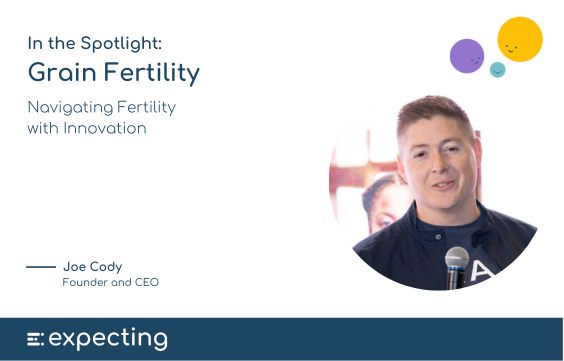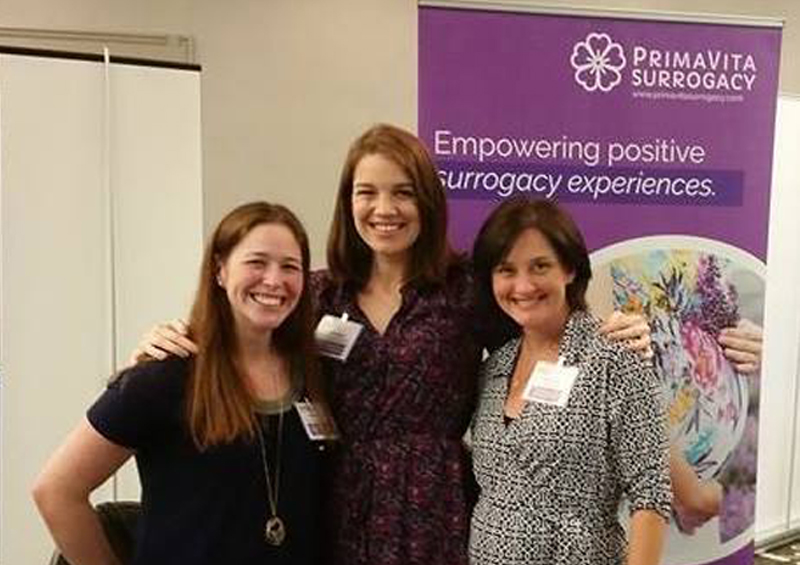Providers Close Up
Navigating Fertility with Innovation: The Story of Grain Fertility
The journey to parenthood, especially through assisted reproductive technologies like IVF, surrogacy, and egg donation, is often complex and emotionally taxing. Grain Fertility, born from the personal struggles of its founders, seeks to revolutionize this journey by introducing a digital platform that enhances coordination, communication, and information accessibility between patients and their healthcare providers. This article delves into the inspiration behind Grain Fertility, the challenges it aims to address, and the unique benefits it offers to intended parents. Join us as we explore the personal experiences and aspirations of Joseph Cody, the founder of Grain Fertility, shedding light on how technology can transform the fertility journey.
In a world increasingly reliant on technology to simplify complex processes, the journey to parenthood through assisted reproductive technologies remains notably behind the curve. Grain Fertility emerges as a beacon of hope and innovation, conceived from the heartfelt struggles and insights of Joseph Cody and his wife during their own fertility journey.
With a mission to demystify and streamline the process for countless others, Grain Fertility stands as a testament to the power of personal experience fused with technological innovation. In this conversation, Joseph Cody shares the inception story of Grain Fertility, the personal trials that shaped its creation, and his vision for the future of fertility care.
Interview with Joseph Cody, Founder of Grain Fertility:
Can you walk us through the inspiration behind Grain Fertility?
Grain Fertility didn't stem from a singular moment but evolved as more of what Steven Johnson, author of Where Good Ideas Come From, calls a slow hunch, influenced by our own fertility journey. Throughout the process, we were struck by the lack of coordination and communication among doctors, prompting us to manage extensive documentation ourselves. My wife carried a binder to her appointments, filled with our records and updated lab results, because she found it was easier to recall information our doctors often did not have easy access to. We often would remark to one another that there had to be a better way. In a world where everything, from banking to food orders, was digital, our fertility journey remained mostly analog.
Having a background in Health IT policy, particularly in electronic health record systems, I noticed the healthcare system's lag, with fertility clinics trailing even further behind. After we were lucky enough to have our daughter after nearly 4 years of IVF, the persistent thought of prioritizing the patient's experience lingered. Sitting at the dinner table one day, I turned to my wife and expressed the need to improve the journey for others. Grain Fertility emerged from transforming the challenges of our own experience into a commitment to spare others from similar pains.

How has your personal journey with egg donation influenced Grain Fertility?
Unfortunately, due to our diagnosis, we were told our only shot at having a child was through donor eggs and IVF. Receiving that diagnosis was incredibly hard, but to make it even more difficult, we felt like we were forced to embark on a journey with zero preparation and very little support. How do you make an informed choice of where to seek care, purchase donor eggs, and decide what is the right thing to do when you have so little information?
Grain Fertility stems from our personal struggle, aiming to ease the journey for others. By providing accessible information and connecting patients with resources, we empower them to make informed decisions, whether using their own genetic material or donors. During our own journey, we faced countless questions and a scarcity of information. Grain Fertility strives to bridge that gap by connecting individuals with resources and experts who understand their unique situations, fostering support and guidance throughout their fertility journey.
What advice do you have for intended parents beginning their search for an egg donor?
Start by defining your goals and knowing what is important at the onset of your search. If you are going through this with someone such as a partner or spouse, discuss critical factors such as the importance of shared race or ethnicity with an egg donor and make sure you are aligned with your partner on using the concept of a donor. I remember there were small things that I never would have thought would have mattered as we looked through profiles of donors, but I constantly found myself being influenced by them and it was important to clearly communicate that with my wife. Infertility is hard enough for people. Addressing these considerations early prevents potential friction later in your fertility journey.
It is also important to set your priorities and limits when searching for a donor. Success is not guaranteed and costs and time can quickly escalate without anything to show from it. While we never want to think about failure, it is important to be upfront and honest with ourselves in knowing what our limits are, financially and emotionally. Talking through this with your partner or spouse, a family member, friend, therapist, or someone in a support group can really help. Honestly, I don’t know if we did a good job of that in the beginning because we really didn’t know what we were getting ourselves into.
Could you elaborate on the benefits and features of Grain Fertility for intended parents?
One of the biggest challenges we faced during our journey was the feeling of lack of control. It often felt like we had little control over the choices we faced and the outcomes that followed. We know you cannot control all aspects of fertility care and there is a lot of luck and art that takes place, but Grain Fertility seeks to help patients feel more empowered, save time, and stress less so they can focus on what matters most, their care.
Data shows that patients who are more involved in their care have better outcomes and report a better experience. * Additionally, self-advocacy is shown to help patients feel more prepared for appointments, have safer medical care, and reduce total costs of care by eliminating redundant or unnecessary testing.
- Better Communication with Care team
- Feel More Prepared
- Improved Decision Making
We seek to promote improved self-advocacy by letting patients upload information, such as test results or procedures, from all of their doctors and visualize them through a fertility timeline. This helps ensure a more complete picture of their care in an easy to understand way. We provide intuitive and personalized organizational features, such as customized labeling and keyword search functions, that let our users quickly find any information they need in seconds.
Beyond simple access or organization, we give patients tools and resources to make sense of their information. A patient cannot make an informed decision about their care if they do not have access to as complete a picture as possible and understand what it means in the context of their own journey. We create personalized resources for users tailored for where they are in their journey and give them the opportunity to connect 1 on 1 with fertility empowerment coaches that can help them navigate their journey.
I believe that an educated patient is an empowered patient and we are always looking at ways to help promote access to resources, expertise, and tools that provide the level of education patients need to feel more confident in whatever comes next.
We find that by going through the process of working with someone to understand their information, help them create questions that will answer their questions, and organizing everything, patients often think of things on their own they may have forgotten or never noticed, leading to moments of inspiration that can really help someone.
Looking ahead, what is your vision for the future of Grain Fertility?
Grain Fertility’s goal is to transform how patients and clinics access, share, and use their data. I want to drive personalized insights for patients and their doctors to give patients the best chance to have a child. We believe we can do this in several ways.
First, we want to build a robust ecosystem connecting patients to the services they need that don’t always live within the walls of their fertility clinic. From finding a donor to legal considerations, getting mental help or connecting with a nutritionists that can help improve your health and maximize chances of success, Grain Fertility aims to make this part of the journey easier for patients by connecting them with these services and making it easier than ever to have a more holistic fertility journey.
Second, it is important to meet patients where they are, whether it is at a fertility clinic, virtual care provider, or other ancillary service, and provide them with unique insights into their fertility journey that help improve outcomes and deliver a better experience. We want to partner with these care providers to serve as a care coordination and care management platform that focuses on the patient experience and helps promote better communication by augmenting the patient/ provider relationship.
Personal Snapshot:
Joseph Cody is the founder of Grain Fertility. An IVF dad who has worked in Washington D.C. on health care policy and advocacy since 2008, Joseph is setting out to build the tool he and his wife wished they had when they were undergoing IVF.. He is an active volunteer with RESOLVE: The National Infertility Association, serving as co-chair for Advocacy Day in 2020 and 2021 and currently helping lead community outreach. He lives in Silver Spring, Maryland with his wife Jackie, their daughter Kate, and dog Fuskie.
___________________
Grain Fertility invites fertility patients to begin their journey with a two-week risk-free trial of our Premium Version. Sign up today at Grain Fertility Signup and schedule your complimentary introductory call to discover how we can support your unique journey to parenthood.
*https://ahimafoundation.org/media/ngfbggsk/oct2021_understanding_access_use_health_information_america_ahima_foundation.pdf
*https://www.ncbi.nlm.nih.gov/pmc/articles/PMC6996004/#:~:text=Patients%20who%20participate%20in%20their,treatment%20plans%3B%20have%20reduced%20decisional





